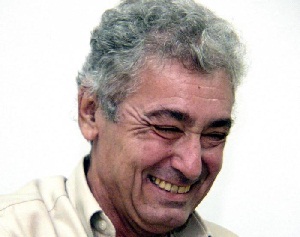 Sergio Vitier was one of the most versatile, authentic and essential Cuban musicians of the last fifty years. On the morning of Sunday, May 1, Vitier died in Havana, at age 68, victim of a stroke.
Sergio Vitier was one of the most versatile, authentic and essential Cuban musicians of the last fifty years. On the morning of Sunday, May 1, Vitier died in Havana, at age 68, victim of a stroke.
Renowned for his masterful compositions and unquestionable talent as a guitar player – which saw him win the well-deserved 2014 National Music Prize – Vitier approached the most diverse fields of music in a uniquely personal way.
Sergio was the firstborn son to a couple which had already left an indelible mark on Cuban culture, writers Fina García Marruz and Cintio Vitier – the latter was also a violinist – and brother to José María Vitier, another essential name in Cuban music; while his uncle Felipe Dulzaides, jazz musician and vocal coach, represented an early paradigm for the young composer.
Vitier studied guitar with Elías Barreiro and Isaac Nicola, and completed his musical education with Leo Brouwer, Federico Smtih, José Loyola and Roberto Valera. He also benefited from the wisdom of male and female figures from Afro-Cuban culture and traditions.
Such influences are apparent in his works, characterized by his blending of the fundamental cultures which make up Cuban identity, and in his extensive work with folklorist Rogelio Martínez Furé in the group Oru.
Vitier made a decisive contribution as author and vocalist to ICAIC’s Experimental Sound Group and the Cuban film industry in general, for which he wrote numerous scores including for the films La tierra y el cielo (Manuel Octavio Gómez), De cierta manera (Sara Gómez), Capablanca (Manuel Herrera), El brigadista (Octavio Cortázar), Caravana (Rogelio París), Che (Miguel Torres), Quiéreme y verás (Daniel Díaz Torres) and Roble de olor (Rigoberto López).
He is widely recognized for the sound track he produced with his brother José María, for the television series En silencio ha tenido que ser.
Vitier’s discography includes award winning albums, Homenajes (Egrem Award 1997), Travesía (Cubadisco Award 2000), Nuestra canción (Cubadisco Grand Prize 2001), Del Renacimiento a la Rumba and Aniversario (Cubadisco 2005 nominees).
The outstanding musician also produced other memorable works for dance and theatre productions, in a wide range of formats, from guitar scores to symphonies.
In an interview with this journalist, Vitier statede, “Music has an academic component, vital to composing and playing an instrument, but this isn’t enough. If you want to be a true musician you have to open up your pores and heart to human experience and intuition, that is to say, to culture and emotion.
(Granma)